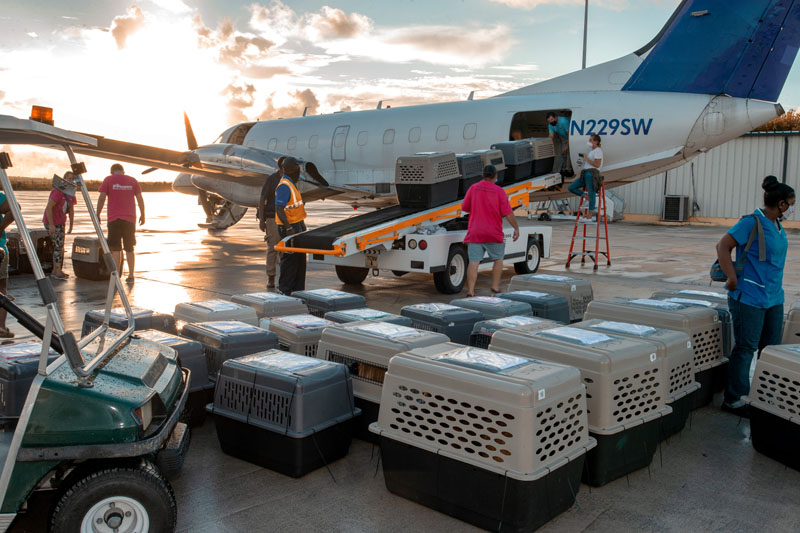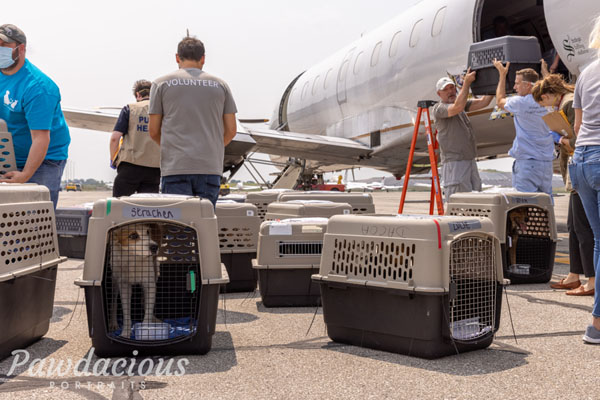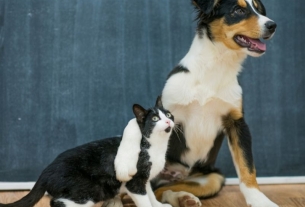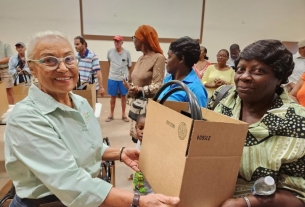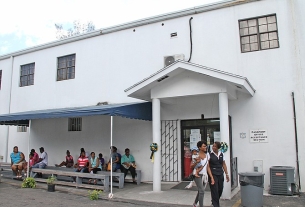By: Jhanae Winter
Seventy-two dogs took a one-way trip to Michigan, Wednesday morning, where they will be dispersed to various shelters in the State, to be adopted by families.
Bahamas Humane Society (BHS) teamed up with Michigan Humane (MH) for this first- time collaboration and very successful mission. The dogs were flown to Michigan by Wings of Rescue, a charity organisation that flies at-risk shelter pets from disaster areas and overcrowded shelters to safe havens. This Freedom Flight was sponsored by the Kohler family.
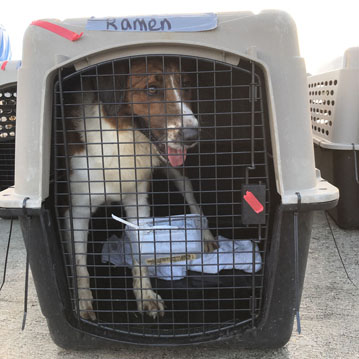
Michigan Animal Rescue League board member, donor and consultant, Ralph Caplan, worked with Duke & Lisa Wells in The Bahamas, to instigate this rescue mission between the BHS and Michigan Humane. After seeing the overcrowded conditions of the shelter, Caplan was compelled to help in any way he could.
On Their Way to New Homes
How You Can Help BHS Save More Potcakes
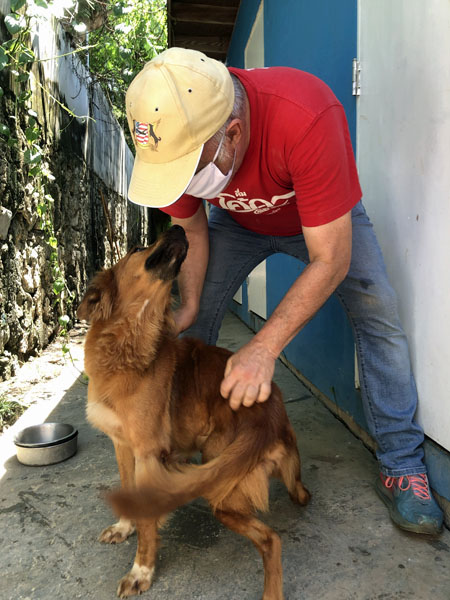
The dogs will travel to six different ‘no kill’ shelters under Michigan Humane direction. Michigan Humane officials will quickly determine which dogs are immediately ready for adoption and which dogs need extra care and will remain at the shelters until ready for adoption.
CEO of MH, Matthew Pepper said, “Assuming they are all in good condition and there are no issues, they are going to be put up for adoption and hopefully be in homes within a week.”
Ralph Caplan said, “I discussed with my Executive Director at the Michigan Animal Rescue League how we could help the dogs with issues.”
Five of the dogs on the flight have issues requiring special care and attention. They will go to the Michigan Animal Rescue League (MARL) where they will get the special care they need.
“We’re also going to be taking some of the other dogs but we will be taking five of the ones they were just praying to get on the plane,” he said.
One of the dogs headed to MARL will be Francesco, a sweet little potcake who was rescued by the BHS in February after a concerned citizen raised an alarm about a dog that was being abused, starved and tied to a tree. He was severely emaciated and would not allow a human near him for fear of being hit. After many months of rehabilitation and care, including heartworm & tick treatment, and compassionate fostering by Steph and Peter Hickman, Francesco was ready for the Freedom flight.
“He has turned out to be such a loving dog,” Ms Hickman said, as she held Francesco for the last time before sending him away to a new life. “Ralph has made this dog his special project,” she added.
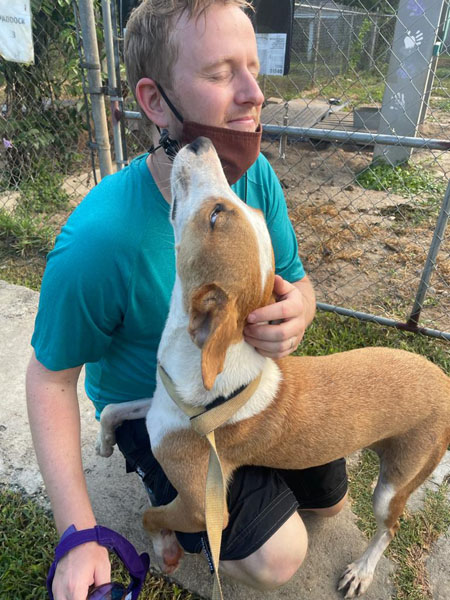
Those involved describe this rescue mission as a “win-win -win situation”, for both organizations and especially the animals.
BHS is relieved of animals, which helps alleviate the overpopulation at the shelter, allowing them the ability to better care for the remaining animals.
Meanwhile, due to their highly effective spay and neuter program, the state of Michigan has a shortage of dogs available for adoption. This mission gives Michigan families the opportunity to add a Bahamian potcake to their family.
Mr Pepper explained that about one out of five new pets are coming from shelters in Michigan and that population dynamics are changing in shelters.
“The reality is, the demand by people wanting to add a pet to their home is exceeding, in many instances, our ability to provide those animals. So partners like this allow us to continue to meet that need and it also fosters the attention given to the dogs here. Someone might come in because they heard about a dog from The Bahamas and fall in love with one right here in Detroit,” he said.
The CEO expressed that he can confirm the many good things he has heard about the team at the Bahamas Humane Society and all the great work they are doing.
“The process has been nothing short of impossible but the people at the Bahamas Humane Society have been great partners. They are doing this for the right reasons, they are committed to it and they are doing it the right way,” he said.
“In order to decrease the number of stray dogs and other animals, the emphasis must be on spaying and neutering animals. This is the only way to curb the issue now and in the future.”
On the day of the mission, the furry friends were up at 3am to be transported to the airport. Each dog was situated in their own travel crate, with the necessary paperwork and colour-coded shelter information attached. Then, by conveyor belt, they were carefully loaded onto the plane. All the dogs have been embedded with a small unique 15-digit microchip, for identification, a legal requirement in the United States and Europe.
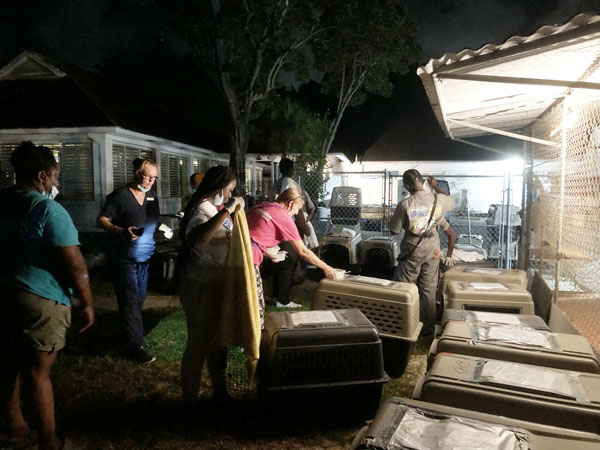
These potcakes, ranging from six months to six years, are the first Caribbean dogs to go to Michigan Humane.
Before these potcakes could travel over 1,000 miles in the air, several tests and processes had to be completed to ensure the animals were approved for import into the United States and specifically, Michigan.
BHS board member Shelley Hardman said the BHS staff worked hard over a two month period, taking the dogs through all the required testing, including medical examinations and behavioral assessments to ensure they were adoptable.
“They [MH] wanted every dog to be able to walk on a leash and not every dog can because they have never done it before, it’s like a foreign object to them. With the younger dogs (eight or nine months) that are too scared to walk on a leash, MH is confident they can teach them. We also had to walk past other dogs to make sure there were no fights. We made sure we kept in communication with Michigan and told them what was going on,” Ms Hardman explained.
Due to Michigan’s strict protocols regarding the importation of dogs, there was a limited number that could be transported. After careful consideration – 72 were chosen.
Over a three-day period, prior to the flight, all the selected dogs were washed, carefully re-examined for ear mites and ticks and had their nails clipped.
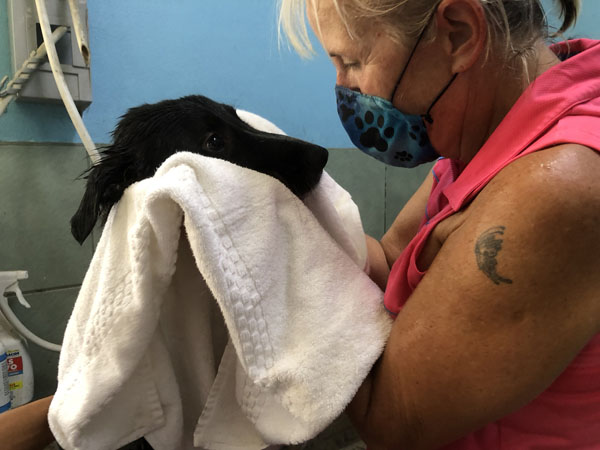
Of the 72 dogs, eight had been fostered in the homes of volunteers.
Foster animals are those that might be too young, or timid to be at the shelter, or those needing special care and attention.
“People take animals into their home from the shelter and they foster them, so they look after them until it’s time to be rescued or go on an airlift. Some of the dogs that were fostered today were rescued and the people that rescued them kept them until they could go on the airlift,” Ms Hardman said.
A touching moment occurred during the departure as the fosters’ parents had to say goodbye to the dogs they’ve looked after. Some were overwhelmed with emotion, tears rolling down their faces, as they hugged and kissed these dogs they have come to love..
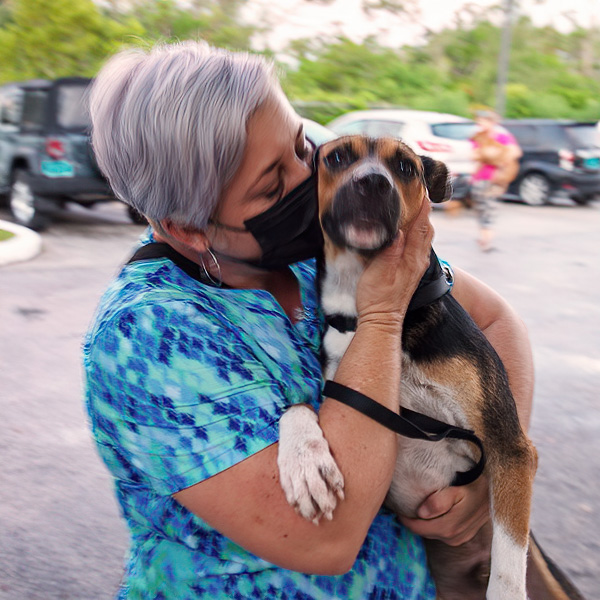
BHS staff reassured the foster parents that the dogs will be adopted into good families in Michigan and will be loved. The scene can be compared to parents releasing their children to kindergarten for the first time.
BHS is grateful for opportunities like this, to give these animals a chance for a better life, and share our beloved Bahamian potcakes with the world.
Continuing efforts to reduce overpopulation at the shelter, plans are already in the works for additional missions, to give Bahamian dogs good homes where they will be loved and cherished.
“In our facility we have over 650 dogs and cats, which is unbelievable considering we’ve sent over 1,000 animals to Florida, Nova Scotia and Toronto already. Our shelter really can comfortably hold 250-300 animals, so you can see the struggles we face”, Ms Hickman said.
However, airlifts are not the solution to the problem and the BHS is not relying on these freedom flights alone to “bail us out”, Ms Hardman said.
Help BHS Save More Potcakes
“If the animals stayed here they would not be adopted locally at a rate we would need to clear the shelter. This will not clear the shelter in any shape or form because we have over 300 dogs and a similar amount of cats,” she expressed.
Within just a few days, the 72 dogs that have left the shelter will be replaced by other rescued, or surrendered animals.
“As a no kill shelter we try to save every animal that comes in there. But being a no-kill shelter means we need to get animals out. We can get up to 50 surrenders a week but not 50 adoptions a week, so we are constantly increasing,” Ms Hickman said.
In order to decrease the number of stray dogs and other animals, the emphasis must be on spaying and neutering animals. This is the only way to curb the issue now and in the future.
Not only does spaying and neutering animals help with animal overpopulation, but also disease control, abnormal behavior and ends the suffering.
“Spaying and neutering is how we can bring the Bahamian potcake overpopulation problem under control, long term. The flights at this point in time are just a band-aid. It’s better for the animals’ health and society as a whole. It eliminates animal abuse and having strays running around,” Mr Caplan said.
During this summer , BHS completed 700 free spays and neuters in their Sunday Spay Days program. This initiative will continue in the Fall 2021, September through November.
In this rescue mission BHS faced many challenges dealing with international laws and regulations, funding, donations and getting volunteers. However, through persistence and dedication, they navigated through every situation to bring this mission to fruition, saving Bahamian potcakes.
“It’s been a lot of work and investment, but we are willing to do it. Until we control the potcake overpopulation here in the Bahamas, this is something we will have to keep doing,” Ms Hardman said.
